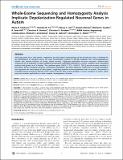| dc.contributor.author | Chahrour, Maria H. | |
| dc.contributor.author | Yu, Timothy W. | |
| dc.contributor.author | Lim, Elaine T. | |
| dc.contributor.author | Ataman, Bulent | |
| dc.contributor.author | Coulter, Michael E. | |
| dc.contributor.author | Hill, R. Sean | |
| dc.contributor.author | Stevens, Christine R. | |
| dc.contributor.author | Schubert, Christian R. | |
| dc.contributor.author | Greenberg, Michael E. | |
| dc.contributor.author | Gabriel, Stacey B. | |
| dc.contributor.author | Walsh, Christopher A. | |
| dc.date.accessioned | 2012-07-23T18:55:57Z | |
| dc.date.available | 2012-07-23T18:55:57Z | |
| dc.date.issued | 2012-04 | |
| dc.date.submitted | 2011-10 | |
| dc.identifier.issn | 1553-7390 | |
| dc.identifier.issn | 1553-7404 | |
| dc.identifier.uri | http://hdl.handle.net/1721.1/71762 | |
| dc.description.abstract | Although autism has a clear genetic component, the high genetic heterogeneity of the disorder has been a challenge for the identification of causative genes. We used homozygosity analysis to identify probands from nonconsanguineous families that showed evidence of distant shared ancestry, suggesting potentially recessive mutations. Whole-exome sequencing of 16 probands revealed validated homozygous, potentially pathogenic recessive mutations that segregated perfectly with disease in 4/16 families. The candidate genes (UBE3B, CLTCL1, NCKAP5L, ZNF18) encode proteins involved in proteolysis, GTPase-mediated signaling, cytoskeletal organization, and other pathways. Furthermore, neuronal depolarization regulated the transcription of these genes, suggesting potential activity-dependent roles in neurons. We present a multidimensional strategy for filtering whole-exome sequence data to find candidate recessive mutations in autism, which may have broader applicability to other complex, heterogeneous disorders. | en_US |
| dc.description.sponsorship | National Institutes of Health (U.S.) (Grant no. T32 NS007473-11) | en_US |
| dc.description.sponsorship | National Institutes of Health (U.S.) (Grant no. T32 NS007484-11) | en_US |
| dc.language.iso | en_US | |
| dc.publisher | Public Library of Science | en_US |
| dc.relation.isversionof | http://dx.doi.org/10.1371/journal.pgen.1002635 | en_US |
| dc.rights | Creative Commons Attribution | en_US |
| dc.rights.uri | http://creativecommons.org/licenses/by/2.5/ | en_US |
| dc.source | PLoS | en_US |
| dc.title | Whole-Exome Sequencing and Homozygosity Analysis Implicate Depolarization-Regulated Neuronal Genes in Autism | en_US |
| dc.type | Article | en_US |
| dc.identifier.citation | Chahrour, Maria H. et al. “Whole-Exome Sequencing and Homozygosity Analysis Implicate Depolarization-Regulated Neuronal Genes in Autism.” Ed. Daniel H. Geschwind. PLoS Genetics 8.4 (2012): e1002635. | en_US |
| dc.contributor.department | Massachusetts Institute of Technology. Research Laboratory of Electronics | en_US |
| dc.contributor.approver | Schubert, Christian R. | |
| dc.contributor.mitauthor | Schubert, Christian R. | |
| dc.relation.journal | PLoS Genetics | en_US |
| dc.eprint.version | Final published version | en_US |
| dc.type.uri | http://purl.org/eprint/type/JournalArticle | en_US |
| eprint.status | http://purl.org/eprint/status/PeerReviewed | en_US |
| dspace.orderedauthors | Chahrour, Maria H.; Yu, Timothy W.; Lim, Elaine T.; Ataman, Bulent; Coulter, Michael E.; Hill, R. Sean; Stevens, Christine R.; Schubert, Christian R.; Greenberg, Michael E.; Gabriel, Stacey B.; Walsh, Christopher A. | en |
| mit.license | PUBLISHER_POLICY | en_US |
| mit.metadata.status | Complete | |
